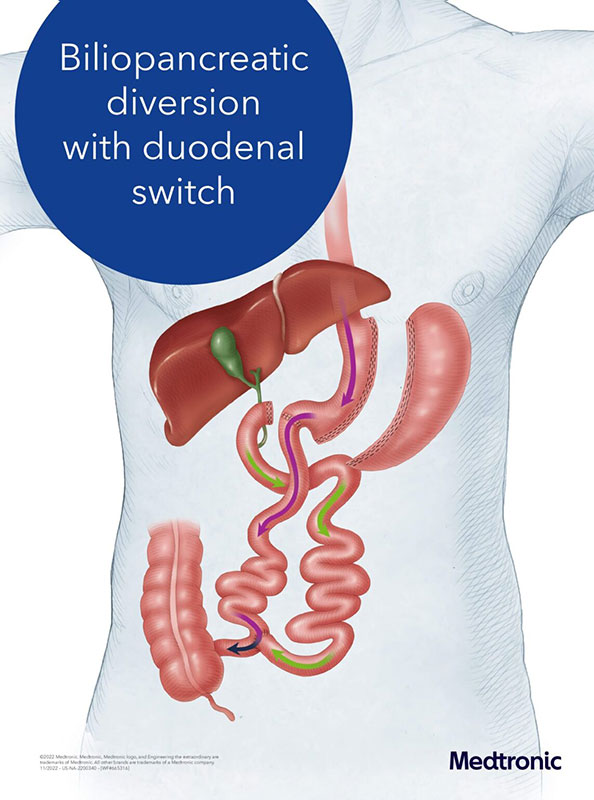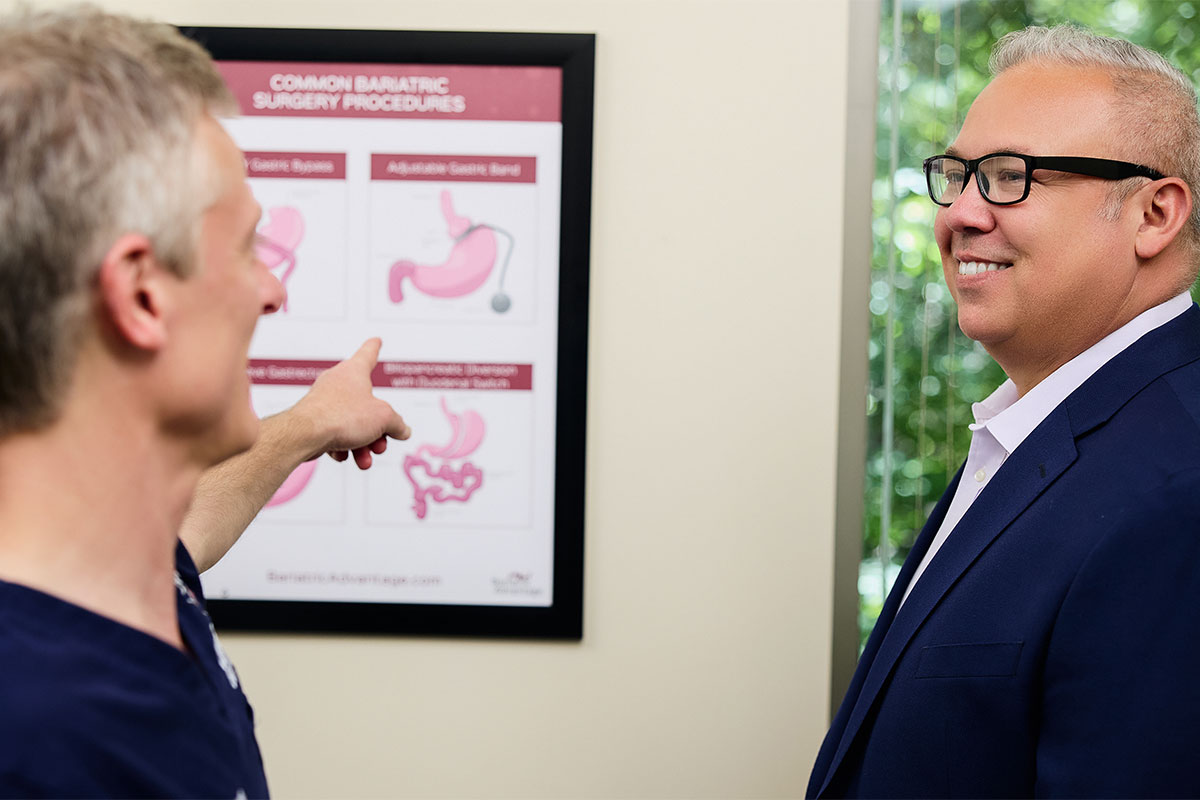Duodenal switch (DS) is a complex, minimally invasive weight loss surgery performed by Dr. Chad Carlton. It combines techniques from gastric sleeve and bypass surgeries, helping you feel full faster and reducing nutrient absorption for effective, long-term weight loss.
Combine the Benefits of
a Gastric Sleeve and Bypass
Duodenal switch in Plano (DS) is a minimally invasive weight loss surgery that combines the gastric sleeve and bypass techniques. Performed by Dr. Carlton, this procedure involves removing three-quarters of your stomach, leaving a small, banana-shaped portion. The surgery also bypasses a significant part of your small intestine, reducing the area where food and digestive enzymes meet. This not only makes you feel full faster but also decreases the absorption of nutrients and calories, leading to substantial, long-term weight loss.
Two Convenient Locations
Experience life-changing weight loss with DS at LoneStar Bariatrics, available at our Plano and Waxahachie locations. Contact us today to schedule your consultation.

Benefits of Duodenal Switch (DS):
- Significant and sustained weight loss
- Rapid improvement in obesity-related health conditions
- Reduced hunger and increased feeling of fullness
- High success rates for long-term weight maintenance
- Effective for patients with a high BMI
- Minimally invasive laparoscopic procedure
- Improved quality of life and physical mobility
- Lower risk of cardiovascular diseases
- Enhanced metabolic health and reduced insulin resistance
How Does the Duodenal Switch (DS) Work?
Duodenal switch in Plano (DS) works by combining two surgical techniques to promote weight loss. First, the restrictive component involves removing about 75% of the stomach, leaving a small, tube-shaped portion that limits the amount of food you can eat. This smaller stomach makes you feel full faster and reduces your overall calorie intake. Additionally, this alteration impacts hunger hormones, decreasing your appetite and helping you manage your food intake better.
The malabsorptive component involves bypassing a significant portion of the small intestine. By rerouting the intestines, the procedure reduces the area where food mixes with digestive enzymes, limiting nutrient and calorie absorption. This means your body absorbs fewer calories from the food you eat. Together, these changes lead to substantial, long-term weight loss while also improving metabolic health and reducing obesity-related health conditions.
Am I a Candidate for a Duodenal Switch (DS)?
You might be a candidate for duodenal switch (DS) if you have a body mass index (BMI) of 40 or higher or a BMI of 35-39.9 with weight-related health issues. This surgery is also suitable if you’ve struggled to lose weight through diet and exercise alone. To be a good candidate, you must commit to significant lifestyle changes, including dietary adjustments and regular follow-ups. Dr. Carlton will work closely with you to determine if duodenal switch in Plano is the best option for your goals.

*Actual Successful & Satisfied LoneStar Patient
How Much Weight Can I Lose With the Duodenal Switch (DS)?
With the duodenal switch (DS), you can expect to lose over 80% of your excess body weight. Most patients lose more than 70% of their excess weight within the first year. This rapid and significant weight loss continues, with around 70% of patients maintaining their weight loss for ten years or more. The DS not only helps you achieve substantial weight loss but also improves or resolves many obesity-related health conditions, enhancing your overall quality of life.
Duodenal Switch (DS) FAQs
What is the Recovery Time for Duodenal Switch Surgery?
The recovery time from a duodenal switch in Plano typically involves a hospital stay of two to three days. Most patients can return to normal activities within two to four weeks, but full recovery may take months. During this period, you will need to follow a specific diet and gradually reintroduce solid foods.
Will I Need to Take Supplements After DS Surgery?
Yes, you will need to take vitamin and mineral supplements for life. This is because the malabsorptive component of the surgery reduces the amount of nutrients your body can absorb, so you’ll need to take multivitamins, calcium, vitamin D, iron, and vitamin B12.
What Dietary Changes Will I Need to Make After DS Surgery?
After DS surgery, you will need to follow a high-protein, low-carbohydrate diet. Initially, you will be on a liquid diet, following which you’ll gradually progress to pureed foods and then to solid foods. You will need to eat small, frequent meals and avoid high-fat and high-sugar foods to prevent complications like dumping syndrome.
Are There Any Risks Associated With Duodenal Switch Surgery?
As with any surgery, there are risks associated with duodenal switch in Plano. These can include infection, bleeding, blood clots, and complications from anesthesia. Specific to DS, there can be risks such as bile reflux, anastomosis leaks, nutrient deficiencies, and bowel obstruction. However, Dr. Chad Carlton takes every precaution to minimize these risks.

Why Choose Dr. Carlton?
Dr. Carlton is a board-certified bariatrics and general surgeon and a Fellow of the American College of Surgeons. He is known for his exceptional patient care and attention to detail throughout the entire surgical and weight loss process. With his expertise and compassionate approach, you can trust that you are in the best hands. Schedule a consultation to explore how the duodenal switch (DS) can transform your weight loss journey and improve your health.
Contact LoneStar
Bariatrics Today
*Actual Successful & Satisfied LoneStar Patient